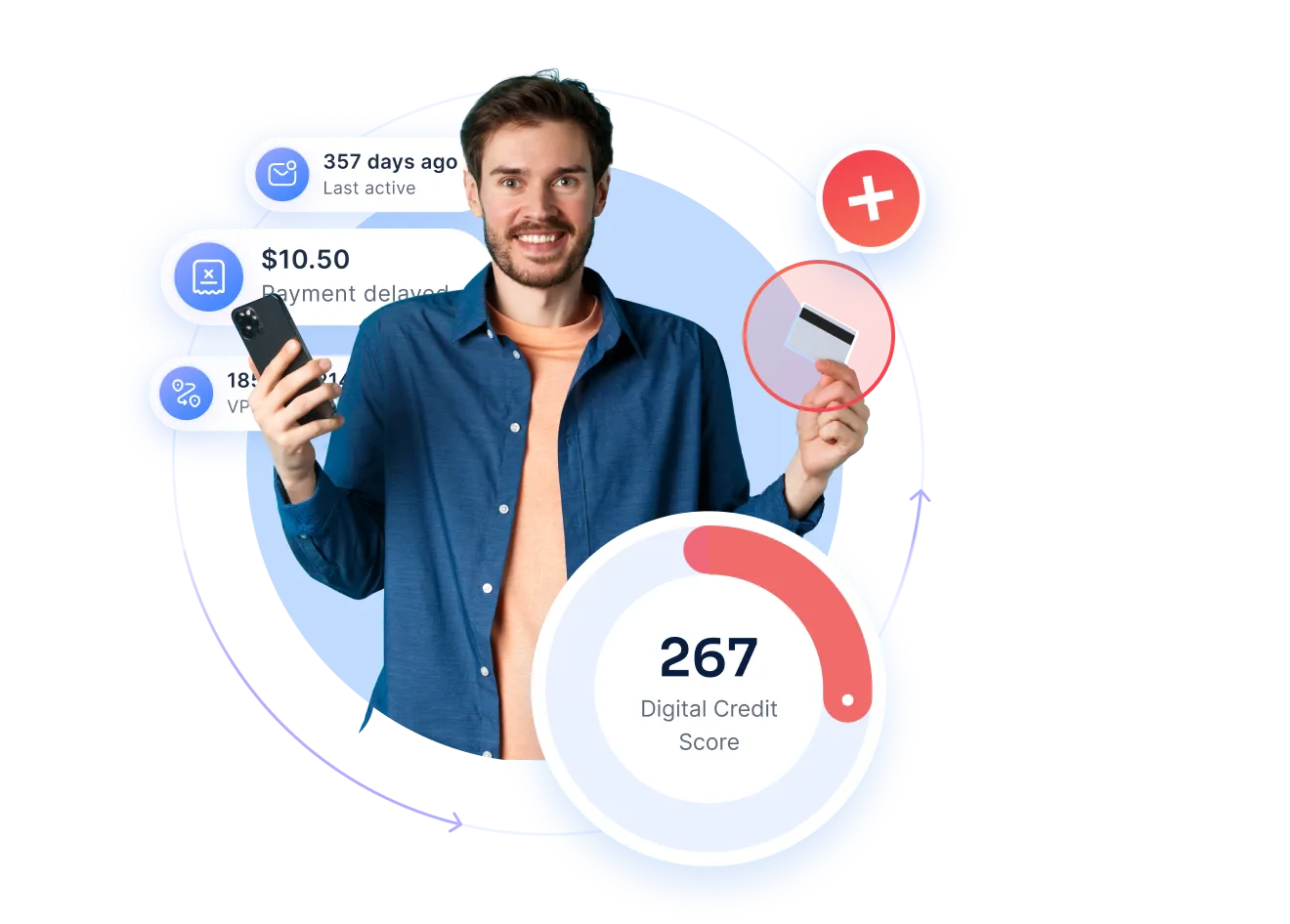The Three Tips on How to Lend More to Emerging Markets
Find practical advice to help you identify valuable clients among those without a credit history and issue more loans.
.webp)
Imagine you're the founder of a fintech company planning to lend to populations in developing countries. This is a promising direction as there are many such markets.
According to WorldData, there are currently 152 countries with developing economies worldwide. Their total population is 6.82 billion, accounting for 85% of the planet's population.
However, when entering emerging markets, be prepared for the fact that a large portion of their residents are unbanked.
For instance, over 350 million adults in African countries are financially isolated. This means issuing them credit based on their credit history is impossible.
Understanding emerging markets - important statistics
To successfully lend to populations in developing markets, it's important to understand the peculiarities of their economy, user behavior, and regulatory framework and be aware of the problems inherent in such countries.
One characteristic of countries with developing economies is that the majority of workers are informally employed. World Bank shows that 70% of jobs in such states do not involve formal employment contracts.
Since a stable official income is a mandatory requirement for obtaining a bank loan, this poses a serious problem for lenders.
The same issue arises for self-employed individuals, who comprise an average of 53% in developing countries. The leaders in this are India, Madagascar, and Ghana.

Many workers also cannot provide banks with either employment documents or financial transaction data since they often engage in retail trade with cash.
Another requirement banks have for traditional loan processing is the client's physical presence in the lending organization.
However, an estimated 3.4 billion people, or 45% of the world's population, live in rural areas of developing countries. This means many of them do not have physical access to bank branches. So, once again, they cannot obtain credit.
This makes innovative financial technologies such as online lending and digital credit scoring technology for emerging markets vital.
Top emerging countries
To classify a country as having a developing economy, the International Monetary Fund analyzes three indicators:
- Per capita income.
- Diversification of export goods.
- Degree of participation in the global financial system.
All these indicators characterize the level of development of their economy and should be considered when assessing the prospects of doing business there.
Here is a list of countries that you should pay attention to if you plan to lend to the population of such markets:
Brazil, India, and China. Golden Gate University states these countries are currently considered leading emerging markets.
CIVETS countries: Colombia, Indonesia, Vietnam, Egypt, Turkey, and South Africa. Experts believe that the economic significance of these lands will significantly increase soon.
Other countries: Chile, Czech Republic, Hungary, Indonesia. These states also have the potential for business development in the fintech sector.
Tip #1. Enrich credit models with alternative data
Insufficient coverage of the population by banking services, informal income, and lack of physical access to branches all impose certain limitations on traditional credit scoring methods.
When creating a scoring model for lending to populations in developing countries, it is not advisable to abandon traditional data completely. It is useful to enrich it with data from alternative sources.
You can do this by analyzing the digital footprint of users:
- IP data. Use data on VPN or proxy use, connecting through Tor, datacenter IP, blacklist database checks, suspicious open ports, and geolocation data.
- Phone number data. Gather information about registered messengers, such as WhatsApp, Telegram, Viber, Snapchat, Facebook Messenger, and more. You can also detect invalid numbers, disposable numbers, virtual SIMs, burner phones, country codes, and IP location mismatches.
- Email address data. Useful information here would include deliverability, social profiles registered using the email address, data breaches involvement, domain registration date, throwaway email profiles, and spam-listed addresses. Such checks are often performed via an email lookup service, which allows lenders in emerging markets to quickly validate borrower identities and enrich credit scoring models.

Tip #2. Use innovative methods to verify the user
Additional methods for verifying borrowers help reduce the risk of identity theft and ensure that the applicant is indeed who they claim to be.
Such methods include:
Face matching. This is the process of verifying the identity of a potential borrower by comparing their facial features with a photo from an official database.
This technology serves as an additional layer of security, reducing the likelihood of someone taking out a loan under someone else's name using forged documents.

Intelligent name verification. This method involves matching the name provided by the applicant with data from various sources of identification information.
To ensure high accuracy, this method often employs name verification systems based on machine learning, NLP, and other AI tools.
Tip #3. Incorporate regional online platforms to gather data
Analyzing local online resources lets you assess potential borrowers' user habits and identify their tendencies.
For example, frequent activity on gambling platforms may indicate an additional risk of default. Frequent purchases on marketplaces may indicate the client's creditworthiness.
Here are examples of some local services you can consider as alternative data sources for credit scoring:
1. Local platforms. Examples of such sites include gambling platforms, marketplaces, online shops, ticketing sites or apps.
In our material on alternative credit scoring in India, you can learn in detail which local platforms are best used as alternative data sources in this country.
2. Local social media. Even the most well-known social networks may not be popular in all countries, yielding to local competitors.
Weibo is the local equivalent of Twitter in China. The platform QQ is also popular here.
In South Korea, users prefer the internet portal Naver, while in Japan, active users are on the Mixi social network.
Many German-speaking countries (Germany, Austria, Switzerland) choose the business-oriented network Xing.
3. Local messengers. The same situation applies to messengers. You can obtain much more data from local apps, where more residents of a specific country are registered.
For example, WeChat is popular in China, Line in Japan, Taiwan, Thailand, and Indonesia. South Koreans use KakaoTalk for messaging, while Vietnamese use Zalo.
How RiskSeal assists in entering into emerging markets
At RiskSeal, we are often asked whether our Digital Credit Scoring API has global coverage or only works in certain parts of the world.
In addressing this question, we want to draw your attention to the fact that we have processed over a million transactions in emerging markets, allowing us to draw certain conclusions:
1. Our API performs differently in various regions, as evidenced by our experience supporting fintech brands in Europe, Asia, Africa, and LATAM.
2. When selecting alternative data sources to enrich client scoring models, it's essential to consider the market characteristics where they operate. In Western countries, people make purchases on Amazon, communicate via WhatsApp, and use Uber for transportation. In Vietnam, however, WhatsApp isn't popular; the dominant messaging app there is Zalo.
That's why at RiskSeal, we always add regional services for an applicant’s behavior analysis. This allows us to effectively collect digital footprints regardless of where we operate.
Such an approach to credit scoring yields excellent results. After all, borrowers who seek to utilize online lending platforms do so via the internet. Surely, they visit other resources, leaving behind a wealth of data.
Data is the key that RiskSeal uses to unlock the door for fintech companies to emerging markets.

Download Your Free Resource
Get a practical, easy-to-use reference packed with insights you can apply right away.

Download Your Free Resource
Get a practical, easy-to-use reference packed with insights you can apply right away.




FAQ
What role does RiskSeal play in assisting fintechs to enter emerging markets?

RiskSeal analyzes users' digital footprints, which they leave on local platforms, and enriches its clients' scoring models with alternative data.
This allows lending to borrowers without a credit history, thus expanding the target audience of credit organizations and ensuring financial inclusion for the population of developing countries.
Why is financial inclusion critical in fostering growth in emerging markets?

Financial inclusion is crucial for stimulating economic growth in emerging markets. Expanding access to financial services enables the population of developing countries to manage their finances more efficiently, invest in education, and improve their quality of life. In other words, it contributes to economic growth and poverty reduction.
How can fintechs effectively extend more credit to populations without a credit history?

To extend more credit to populations without a credit history, it is advisable to use not only traditional but also alternative data for credit scoring.
Enriching scoring models with data from non-traditional sources allows assessing the creditworthiness of unbanked people, thereby expanding the target audience of credit organizations and ensuring financial inclusion for this segment of the population.
Why is it important to incorporate local online platforms into scoring models for emerging markets?

Various online services and platforms are popular in each market. For example, the widely-used WhatsApp in Western countries is not in demand in Vietnam, where residents use the local equivalent, Zalo.
Analyzing local resources allows obtaining the maximum amount of alternative data about the residents of a specific country.

.svg)

.webp)


.webp)
.webp)